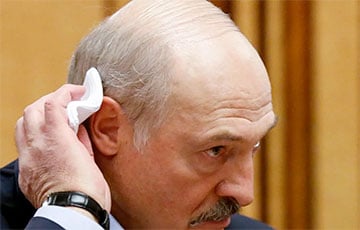Lukashenka's Fiasco At Far Arc
18- Yazep Abzavaty
- 17.02.2025, 12:43
- 26,028

A lot of people are annoyed with the dictator's voyages.
Having announced a 180-degree geopolitical turn after 2020, Belarus has turned from a ‘bridge’ between the East and the West into an Eastern European dead end, exporting supplies through the territory of the ‘union state’. At the same time, Russia became the territory of the basic Belarusian transit. Previously, there was a notorious formula of diversification - 30/30/30 (Europe, Russia and the rest of the world) - which was lip-service sought. According to the new formula ‘Russia + all others’, the countries of the far arc are given substantive attention. But the results of the last four and a half years show that Minsk has not made any serious progress in this direction.
In December, Aliaksandr Lukashenka visited Oman and OFE, and in the context of his presidential campaign, he announced visits to a number of other countries of the far arc, including China, DPRK, Pakistan and Indonesia. The formal reason for the visits is to establish and strengthen business relations with these countries due to the need to diversify markets, as the potential of work in the Russian direction is close to exhaustion.
However, since Lukashenka intended to make the visits before the presidential election, it was obviously a PR campaign. Its meaning was to emphasise the demonstration of support for his re-election by the main states-‘allies’. At the same time, Minsk presented the situation as if these countries initiated the summit visit and sent invitations to Lukashenka.
However, in particular, Kim Yo Jong, sister of North Korean leader Kim Jong-un, sharply denied Lukashenka's statement that North Korea had invited him to the summit in 2025. She emphasised that no such proposal had been made by the DPRK. According to her, Minsk has been trying to establish contact with the DPRK at the highest level for at least two years, yet it incorrectly interpreted the January situation. The sister of the North Korean leader pointed to the importance of a clear expression of intentions on the part of Belarus for developing relations between the countries. And added that the DPRK is ready for cooperation if Belarus shows sincere desire. Then, after a rude rebuke from Kim Yo Jong, the DPRK leader deigned to congratulate Lukashenka on his re-election for another term, but a week late.
A similar situation was observed with the preparation of Lukashenka's visit to China, the instructions for which he gave in December last year. Lukashenka clearly wanted to demonstrate the support of Beijing with this trip. In the end, it turned out that the loud statements about the visit turned out to be just an expression of Lukashenka's own wishes. He never flew to China. It is obvious that the Belarusian leadership also intends to obtain additional financial and economic support from China. It is already known about Minsk's desire to get a new Chinese loan on favourable terms. The objectives and parameters of the loan are still unknown.
At the same time, Lukashenka still hasn't done his ‘homework’ related to normalising the situation in relations with the neighbouring EU states (primarily Poland) in order to guarantee the normal functioning of the railway freight corridor ‘China-Europe-China’. Lukashenka's reappointment for a new term in the conditions of increasing dependence on Russia in the economic and military-political spheres with the prospect of turning Belarus into a Russian military bridgehead clearly does not reduce, but only increases geopolitical risks.
Minsk cannot offer the Chinese leadership any positive agenda. Under these conditions, China is not likely to invest seriously in co-operation with Belarus. At the same time, Beijing is also not likely to make it publicly known, as Pyongyang did.
Nothing is clear about Lukashenka's future visits to Pakistan and Indonesia. It is only known that the Belarusian ruler spoke to the Prime Minister of Pakistan by phone allegedly about the latter's visit to Minsk.
Thus, Lukashenka's regime has not brought added value for the countries of the far arc when building relations with Belarus. In the last five years, the Belarusian leadership's voyages have turned into an endless search for economic and political support, which - in the context of high geopolitical risks - has already somewhat annoyed a lot of ‘friendly’ countries.
Yazep Abzavaty, ‘Our Opinion’











